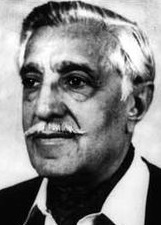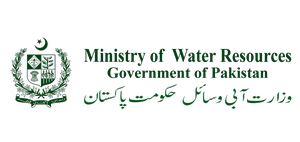
The Afghan Ministry of Energy and Water is a ministry of the government of Afghanistan. Following the U.S. invasion of Afghanistan the ministry had the task of co-ordinating an effort to reintroduce power to areas of Afghanistan that had been cut off. Areas particularly badly affected were southern regions - Pakistan, Iran and India all agreed to supply power. On 17 June 2003 the Asian Development Bank agreed to give a loan of $50 million (USD) to the Afghan Ministry of Energy and Water. The loan would be spent over the next three years on projects for the production, distribution and transmission of electricity in Afghanistan.

Sardar Mir Balakh Sher Mazari was a Pakistani politician who served as Caretaker Prime Minister of Pakistan for five weeks in 1993. He was the tumandar and the paramount sardar of the Mazari tribe which is situated on the tristate area between Balochistan, Sindh, and Punjab provinces of Pakistan.

The Government of Pakistan, constitutionally known as the Federal Government, commonly known as the Centre, is the national authority of the Islamic Republic of Pakistan, a federal parliamentary republic consisting of four provinces, two autonomous territories, and one federal territory.

The Alternative Energy Development Board (AEDB) (Urdu: ہیئت برائے ترقیِ متبادل توانائی) is the sole representing agency of the Federal Government that was established in May 2003 with the main objective to facilitate, promote and encourage development of Renewable Energy in Pakistan and with a mission to introduce Alternative and Renewable Energies (AREs) at an accelerated rate. The administrative control of AEDB was transferred to Ministry of Water and Power in 2006.
As of 2022, nuclear power is provided by six commercial nuclear power plants in Pakistan. Pakistan is the first Muslim majority country in the world to construct and operate civil nuclear power plants. The Pakistan Atomic Energy Commission (PAEC), the scientific and nuclear governmental agency, is solely responsible for operating these power plants. As of 2018, the electricity generated by commercial nuclear power plants constitutes roughly 7.5% of electricity generated in Pakistan, Pakistan is not a party to the Nuclear Non-Proliferation Treaty but is a member of the International Atomic Energy Agency. Pakistan plans on constructing 32 nuclear power plants by 2050 and envisions 40,000 MW of nuclear power generation.
Elahi Bux Soomro or Illahi Bukhsh Soomro is from Shikarpur, Sindh, a Pakistani senior politician and legislator. He was the 16th Speaker of National Assembly of Pakistan. He belongs to an influential political family of Sindh. He has held several federal ministries, including portfolios of Ministry of Industries and Production, Ministry of Housing & Works, Ministry of Defence Production, Ministry of IT, Ministry of Science & Technology, Ministry of Information & Broadcasting, Ministry of Water and Power. He is one of few politicians who have been very close to Presidents and Prime Ministers of Islamic Republic of Pakistan. He has been a close and childhood friend of Zulfiqar Ali Bhutto, favourite of Zia-ul-Haq for the post of Prime Minister, the first minister appointed in the cabinet of and by Ghulam Mustafa Jatoi, Benazir Bhutto used to call him "Uncle", a very close aide to Nawaz Sharif and Ghulam Ishaq Khan, and before 2002 elections, the top army officials had announced his name for the premiership. He was a strong candidate for Prime Minister at numerous times in 1980s as well.

Raja Pervaiz Ashraf is a Pakistani politician, businessman and agriculturist who is the Speaker of the National Assembly since April 2022 and was a member of the National Assembly of Pakistan from NA-58 (Rawalpindi-II). He also served as the 19th prime minister of Pakistan from 22 June 2012 until completing his designated term on 16 March 2013. He has also served as the Senior Vice President of the Pakistan Democratic Movement (PDM), an anti-establishment coalition of political parties in Pakistan.
An energy minister is a position in many governments responsible for energy production and regulation, developing governmental energy policy, scientific research, and natural resources conservation. In some countries, environmental responsibilities are given to a separate environment minister.

Khawaja Muhammad Asif is a Pakistani politician who served as the Defence Minister of Pakistan from April 2022 till August 2023. He had also been a member of the National Assembly of Pakistan from August 2018 till August 2023. Previously, he was a member of the National Assembly from 1993 to 1999 and again from 2002 to 2018 and till date. In May, 2019 he took the charge and became the Parliamentary Leader of PML-N in the National Assembly of Pakistan.

The Ministry of Defence, is an executive ministry of the federal Government of Pakistan, tasked in defending national interests and territorial integrity of Pakistan. The MoD oversees mission execution of its policies and supervises all agencies of the government directly related to the national security and the Pakistan Armed Forces.

According to the United Nations' "UN World Water Development Report", the total actual renewable water resources increased from 2,961 m³ per capita in 2000. A more recent study indicates an available supply of water of little more than 1,000 m³ per person, which puts Pakistan in the category of a high stress country. Using data from the Pakistani federal government's Planning and Development Division, the overall water availability has decreased from 1,299 m³ per capita in 1996-97 to 1,101 m³ per capita in 2004-05. In view of growing population, urbanization and increased industrialization, the situation is likely to get worse. Nevertheless, excessive mining of groundwater goes on. Despite a lowering water table, the annual growth rate of electric tubewells has been indicated to 6.7% and for diesel tubewells to about 7.4%. In addition, increasing pollution and saltwater intrusion threaten the country's water resources. About 36% of the groundwater is classified as highly saline.

The Ministry of Water and Power Urdu: وزارتِ آب و برق, wazarat-e- aabb o barq-e was a federal ministry in Pakistan.

The energy policy of Pakistan is formulated and determined by the federal, provincial, and local institutional entities in Pakistan, which address the issues of energy production, distribution, and consumption of energy, such as gas mileage and petroleum standards. Energy policy requires the proper legislation, international treaties, subsidies and incentives to investment, guidelines for energy conservation, taxation and other public policy techniques.
A ministry of energy or department of energy is a government department in some countries that typically oversees the production of fuel and electricity; in the United States, however, it manages nuclear weapons development and conducts energy-related research and development. The person in charge of such a department is usually known as a minister of energy or minister for energy.

Pakistan–South Korea relations refers to bilateral diplomatic relationship between Pakistan and South Korea. Since the 1980s, the relations between two Asian states have improved and periodically enhanced. Pakistan has an embassy in Seoul, South Korea, and South Korea has an embassy in Islamabad, Pakistan. Pakistan is one of the few countries that has good relations with both North Korea and South Korea.
The Ratle Hydroelectric Plant is a run-of-the-river hydroelectric power station, with permitted pondage under the Indus Water Treaty, currently under construction on the Chenab River, downstream of the village near Drabshalla in Kishtwar district of the Indian Union Territory of Jammu and Kashmir. The project includes a 133 m (436 ft) tall gravity dam and two power stations adjacent to one another. Water from the dam will be diverted through four intake tunnels about 400 m (0.25 mi) southwest to the power stations. The main power station will contain four 205 MW Francis turbines and the auxiliary power station will contain one 30 MW Francis turbine. The installed capacity of both power stations will be 850 MW. On 25 June 2013, Prime Minister Manmohan Singh laid the foundation stone for the dam. Pakistan has frequently alleged that it violates the Indus Waters Treaty.
Xi Jinping's visit to Pakistan from 20 to 21 April 2015, was the first state visit of Xi Jinping to Pakistan. Xi is the second Chinese leader to visit Pakistan in 2010s after Chinese Premier Li Keqiang's visit to Pakistan between 22 and 23 May 2013. It was also Xi's first overseas trip of 2015. The trip led to the signing accords for $46 billion of investment in Pakistan by China for the construction of roads, rails and power plants to be built on a commercial basis by Chinese companies over 15 years. Most of the 51 projects were part of the China–Pakistan Economic Corridor.

The Ministry of Energy is an executive ministry of the federal Government of Pakistan that is charged with implementation of the national energy policy and energy production and electricity transmission throughout the country.

The Ministry of Water Resources (Pakistan) Urdu: وزارت آبی وسائل, wazarat-e- aabi wasail (abbreviated as MoWR) is a Pakistan Government's federal and executive level ministry created on 4 August 2017 by then-Prime Minister Shahid Khaqan Abbasi. The ministry is headed by Pakistan Secretary of Water Resources. The ministry was created out of the Ministry of Water and Power, by depreciating the power division from the ministry, which was merged into the Ministry of Petroleum and Natural Resources and converted into the Ministry of Energy.

The federal secretary is the highest-ranking position in the Government of Pakistan, occupied by the most senior civil servant in a specific ministry or division. The secretary is the administrative head of that ministry or division and oversees and enforces public policy matters. The authority for the creation of this post solely rests with the Cabinet of Pakistan. The position holder is a BPS-22 grade officer, usually belonging to the Pakistan Administrative Service.












